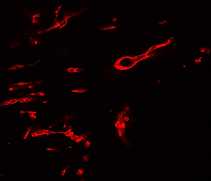Angiogenesis, the growth of blood vessels, is an essential biological process under both physiologic and pathologic conditions. It requires the tight coordination of endothelial cell proliferation, differentiation, migration, of matrix degradation and of cell-cell signaling processes. Angiogenesis is controlled by a variety of growth factors with Vascular Endothelial Growth Factor (VEGF) being one of the most important molecules.
Our interest focuses on the characterization of signalling pathways in endothelial cells in response to proangiogenic stimuli, in particular to VEGF. We are especially interested to understand how signals initiated or controlled by oxidative or metabolic stress affect endothelial cell functions. In this context, we investigate the role of the energy sensor AMP-activated kinase (AMPK) and of oxidant-sensitive signaling molecules such as protein tyrosine phosphatases. Recently, we found that AMPKα1 plays an essential role in VEGF-induced angiogenesis in vitro and in vivo and characterized the VEGF/AMPK/GFAT* pathway as one of the responsible mechanisms (* GFAT - glutamine fructose-6-phosphate amidotransferase; Stahmann N et al. J Biol Chem. 285:10638-52, 2010, Zibrova D et al. Biochem J 474:983-1001, 2017).
The course will provide hands-on training in preparing primary endothelial cells of human or mice origin and in performing different migration and angiogenesis assays (transwell migration, wound healing assays, spheroid assays, matrigel assays). These tests involve cellular fluorescence microscopy and the ECIS (Electric Cell-Substrate Impedance Sensing) technology. Further, the students will get familiar with RNA interference techniques and shRNA lentiviral transduction in primary cells to investigate the role of selected molecules in angiogenesis.



